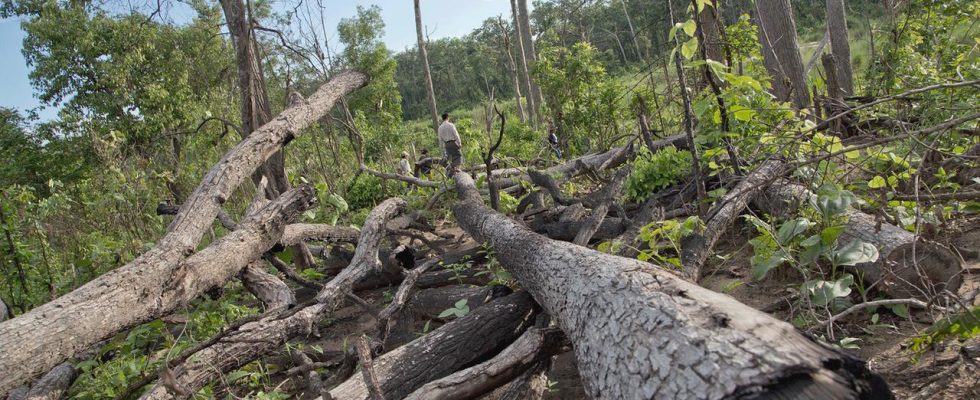exclusive
After the military coup in Myanmar, the EU decided on sanctions. Nevertheless, wood worth 45 million euros has since arrived in the EU. Now voices are being raised about infringement proceedings.
The situation is absurd: the EU bans something – and then provides statistics in which everyone who does not comply with the ban is entered. This is exactly how things have been going for more than two years with a product that actually only the super-rich are interested in: wild-grown teak wood.
An international research led by the International Consortium for Investigative Journalists (ICIJ) in Germany NDR, WDR and “Süddeutsche Zeitung” (SZ) were involved, shows: The banned goods continue to end up in the EU.
Since the sanctions came into force in June 2021, more than 550 tons of wood from Myanmar have officially entered the EU – and in return, more than 45 million euros have flowed to the military regime in Myanmar. This emerges from data from the European statistics authority EUROSTAT, which was evaluated for the research.
Wood imports worth millions
Between January and October 2023 alone, the statistics show wood imports from Myanmar worth 5.6 million euros. The largest quantities arrived in Italy, Poland and Spain. When asked, customs said that “a small amount of teak from Myanmar” had also reached Germany last year, but that it was a sample. Customs did not say what it was intended for or whether the wood was confiscated.
A year ago, a global research project uncovered the massive breach of sanctions. At that time, the EU Commission stated that it was in an “active dialogue” with EU countries that had “difficulties implementing” the sanctions. But apparently the sanctions continue to be broken on a massive scale without the EU intervening.
Last natural occurrences in Myanmar
Unlike plantation teak, wild-grown teak is considered extremely resistant to salt water, sun and wind. It is therefore mostly installed on luxury yachts. But wild teak deposits are considered exhausted. The last natural deposits can only be found in Myanmar.
However, the state has a monopoly on the trade in wood in Myanmar – and with it a military junta, which after the 2021 coup is accused of the most serious human rights violations, torture, arbitrary detentions, expulsions, executions and, last but not least, the genocide against the Rohingya. That is why the EU imposed sanctions in June 2021, including on trade in wood from Myanmar.
EU accepts responsibility Member States
This means that no timber deliveries from the former Burma should actually appear in the EU’s trade statistics – but they do. The EU Commission left questions about the research results unanswered, but has so far always pointed out that the member states are responsible for implementing adopted guidelines.
For Bernd Lange, for the SPD in the European Parliament and chairman of the Trade Committee, that is not enough. “If you can prove that European legislation has been disregarded, then of course the Commission should investigate,” he says.
“If there really are individual countries that are deliberately turning a blind eye, then you have to take action against it with an investigation process or even a breach of contract lawsuit.”
MEPs demand legal consequences
Thomas Waitz, himself a forester and a member of the Green Party in the European Parliament, also demands that, given the ongoing imports from Myanmar for years, the EU must now initiate infringement proceedings against those states that do not stop these deliveries.
Both Lange and Waitz also believe that the EU needs to tighten up the formulation of sanctions. Because: It is not the product of wood from Myanmar that is banned – but “only” cooperation with the state timber trading agency MTE. Since the MTE has a monopoly on deforestation and the export of wood in Myanmar, the EU Commission assumes that all wood imports are also subject to the sanctions.
Paradoxically, some member states apparently see things differently. And even in Germany, the authorities have different opinions about what the sanctions actually mean. The Ministry of Agriculture replied that under the current EU sanctions it was “inadmissible to import raw and sawn wood from Myanmar.” At the same time, a customs spokeswoman explains that a “general ban on the import of wood (…) is not regulated under embargo law.”
To the project
The #deforestationinc research project was led by the International Consortium for Investigative Journalists (ICIJ). 140 journalists from all over the world were involved in the nine-month research.
The 39 media outlets involved in the research are in Germany NDR, WDR, “Süddeutsche Zeitung” and “Spiegel”. Internationally, CBC in Canada, ORF in Austria, “Le Monde” and “Radio France” in France and “The Indian Express” in India were among those involved.
The project focuses on the ongoing deforestation worldwide and focuses, among other things, on the questionable trade in sustainability certificates, on the illegal trade in precious wood and on the Romanian timber mafia. All research results are published internationally.

